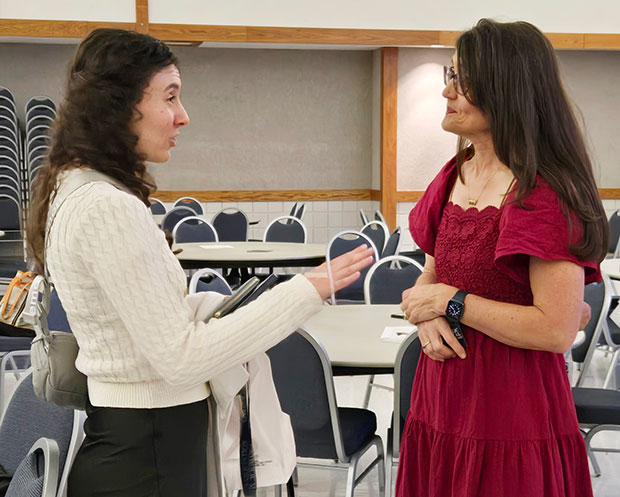
Ashley Best, left, a second year family medicine resident at the University of Iowa, talks with Dr. Michelle Stanford, president of the Catholic Medical Association and pediatrician from Denver, Colorado, following a talk Oct. 11 in Denning Hall at St. Paul the Apostle Parish in Davenport.
By Anne Marie Amacher
The Catholic Messenger
DAVENPORT — “We extend our gratitude to those in the medical profession,” Bishop Dennis Walsh said at the opening of the White Mass Oct. 11 at St. Paul the Apostle Church. The White Mass celebrates medical professionals from physicians and nurses to physical therapists and more.
After Mass, Dr. Michelle Stanford, president of the Catholic Medical Association, spoke to the assembly about an increase in depression and anxiety among young people and offered some insights on what to do about it.
During his homily, the bishop said, “This Mass is a sacred moment of recognition and blessing. A pause in your demanding lives to remember that your work, whether in the clinic, the operating room, the bedside or the classroom, is not merely a profession. It is a profound, life-giving vocation, rooted in the very heart of the Gospel. It is a mission to be the healing hands and the compassionate heart of Christ in the world marked by pain and vulnerability.”
Bishop Walsh told the medical professionals, “For you, physicians and caregivers, your stethoscope, your scalpel, your chart, and your bedside manner are the shepherd’s staff. They are the instruments through which you live out the command to ‘tend my sheep.’”
He told the “medical shepherds” their call is a professional, moral and spiritual imperative. Relating to Pope Leo XIV’s apostolic exhortation “Dilexi Te,” he told them to see Christ in the uninsured, advocate for justice and renounce the superfluous.
“In the challenging moments of your workday, when you are tired, overwhelmed or dealing with bureaucracy — remember the Good Shepherd. He never abandoned the scattered flock. He never charged a fee for the healing touch.”
The bishop continued, “Remember the command to Peter. It was a renewal of his own failed commitment. Your vocation is a renewal too. A daily opportunity to confess your love for Christ by tending to his most precious sheep.”
“May this White Mass strengthen you. May the Holy Spirit fill you with the wisdom, the grace and the endurance necessary to fulfill this magnificent and sacred calling. Go forth and be what God has called you to be: healers of bodies and shepherds of souls.”
Dr. Timothy Millea, president of the St. Thomas Aquinas Guild of the Quad Cities, a chartered guild of the Catholic Medical Association, said this is the 11th year for the White Mass. He noted it is important to protect, defend and promote the principles of the Catholic faith in medicine.
He then introduced Dr. Stanford, a pediatrician from Denver, Colorado who has been the medical association’s national leader since 2024. Following Mass, she spoke in Denning Hall on anxiety and depression in youths.
Stanford said suicide is the second leading cause of death, behind accidents, for ages 15-34 years old. There are many reasons for this, she noted. Although the pandemic worsened problems, suicide, anxiety and depression already were on the rise.
Referring to the book “The Anxious Generation” by Jonathan Haidt, Stanford said the author points out the decrease in play-based childhood started in the late 1980s into the 1990s. That is when playtime started to move online.
“Parents wanted to eliminate the risk of children outside and the media was really talking a lot about things not being safe,” Stanford said. “Parents become overprotective of their children.” Although there are numerous other factors, the rise of digital technology “paved the way to a decline in play-based childhood.” Stanford pointed out that essential components of normal childhood brain development changed.
Communication went online. As a result, youths do not learn conflict resolution or attunement. Texting is not the same as communicating in person. And the introduction of the iPhone and social media between 2010-2015 made for a phone-based childhood, she said.
Since 2010, depression in girls has risen 135% and for boys it is 160%.
Stanford defined anxiety as a disorder in which something is out of the norm. To have anxiety is normal, she noted. “It’s stress that should be manageable.” But when anxiety takes over and interferes with day-to-day activities, alarms ring.
Intervention needs to be sought early on, she noted. Otherwise it can lead to depression. There are different diagnostic tests/questionnaires that can be administered that involve just the youth, the youth and parents or the youth, parents and a teacher. Sometimes it is anxiety. Other times it might be a disorder. But no matter what, “We need to offer help, support, guidance and advice,” Stanford said.
She offered four foundation rules from “The Anxious Generation.” 1. No phones before high school. 2. No social media before age 16. 3. Phone free schools. 4. More unsupervised play and childhood independence.
The doctor offered a number of suggestions for families:
- Share meals as a family.
- Pray as a family.
- Talk about guardian angels that help guide us.
- Take part in the sacraments.
- See your church community as role models and a source of strength.
- Discover the beauty created by God from visits to museums, through artwork, music and dance, to nature and the liturgy.
If mental health issues persist, see your primary care physician. One effective treatment is cognitive behavioral therapy. “It’s incredibly effective,” she said.
If needed, medications can help. Start with low doses and, if it is needed, increase is done slowly, she explained.
Stanford passed out a resource sheet for adults dealing with kids with anxiety. The list included books, service in the community and podcasts. And those interested in finding a Catholic therapist can visit catholictherapists.com or My Catholic Doctor online for telehealth mental health specialists.








